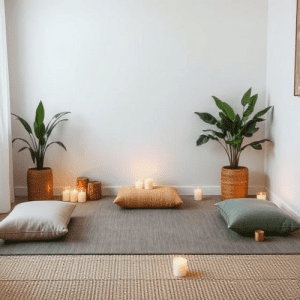In a world that constantly demands more—more productivity, more responsibility, more energy—it’s easy to forget the most important priority: you. Between work, family, chores, and social obligations, the idea of carving out time for yourself can feel like an indulgence, or worse, a selfish act. But here’s the truth: making time for yourself isn’t selfish—it’s essential.
Finding even a few intentional moments in your day to breathe, reset, and nurture your well-being can dramatically improve your mental clarity, emotional balance, and physical health. When you take care of yourself, you show up better for everything and everyone else in your life.
This week in the Home Harmony Project, we’ll explore why finding time for yourself is so important, and how simple practices like breathing exercises, cold showers, and meditation can help you reclaim calm, focus, and energy.
Why You Need Time for Yourself
We live in an age of constant stimulation. Phones buzz, notifications ping, schedules overflow, and the pressure to always be “on” is overwhelming. In this state, your nervous system rarely gets a chance to pause, which can lead to stress, anxiety, fatigue, and even physical illness.
The Benefits of Carving Out Time for Yourself
- Mental clarity – Stepping away from the noise helps your brain process information and think clearly.
- Stress reduction – Breaks allow your body to lower cortisol levels, easing tension and worry.
- Improved focus – Regular self-care enhances concentration and productivity.
- Physical well-being – Practices like meditation and mindful breathing improve heart health, immunity, and energy.
- Emotional balance – Time for yourself helps you regulate emotions, making you more patient, resilient, and compassionate.
Making space for yourself isn’t about neglecting responsibilities—it’s about creating the inner strength to manage them better.
Breathing: The Simplest Reset

Breathing is something we all do automatically, yet when done intentionally, it becomes a powerful tool for mental and physical reset. Deep, controlled breathing can calm the nervous system, improve oxygen flow, and bring clarity to a cluttered mind.
Simple Breathing Techniques to Try
- Box Breathing (4-4-4-4): Inhale for 4 seconds, hold for 4, exhale for 4, hold for 4. Repeat 4–5 rounds.
- The 4-7-8 Breath: Inhale for 4 seconds, hold for 7, exhale for 8. Great for reducing anxiety and preparing for sleep.
- Morning Energiser: Take 20 quick inhales and exhales through the nose to boost alertness and energy.
Even just 2–5 minutes of intentional breathing a few times a day can ground you and prevent stress from spiralling.
Cold Showers: Invigorating the Body and Mind

It may sound unappealing at first, but cold showers are a powerful wellness practice that can sharpen both body and mind. The shock of cold water stimulates circulation, boosts energy, and releases endorphins—the body’s natural “feel-good” chemicals.
Benefits of Cold Showers
- Boosted alertness – Cold water increases oxygen intake and heart rate, waking you up instantly.
- Reduced stress – Cold exposure trains your nervous system to adapt to stress more effectively.
- Improved immunity – Research shows that cold showers may strengthen your immune system.
- Enhanced mood – The release of endorphins and dopamine can elevate mood and reduce anxiety.
How to Start Cold Showers
- Begin with your normal warm shower.
- At the end, switch to cold for 30 seconds.
- Gradually increase over time (up to 2–3 minutes).
- Focus on steady breathing to stay calm.
It’s less about suffering and more about training your resilience—building both physical and mental strength.
Meditation: Clarity Through Stillness

Meditation is often misunderstood as “clearing your mind,” but really, it’s about training your attention. By observing your thoughts without judgment, you build awareness and calm. Over time, meditation improves focus, reduces stress, and enhances emotional balance.
Benefits of Meditation
- Sharper focus – Meditation strengthens the prefrontal cortex, improving attention and decision-making.
- Lower stress and anxiety – Mindfulness reduces overthinking and keeps you grounded in the present.
- Emotional resilience – Regular practice helps you respond calmly instead of reacting impulsively.
- Better sleep – Meditation helps regulate your nervous system, making it easier to fall and stay asleep.
Simple Meditation Practice
- Find a quiet spot and sit comfortably.
- Close your eyes and focus on your breath.
- Notice thoughts as they arise—don’t fight them, just let them pass.
- Start with 5 minutes daily and gradually increase.
Think of meditation as giving your mind a daily reset button—a chance to pause, recharge, and return to the present.
Building Self-Care into Your Routine
The biggest barrier to self-care is often the feeling that “there’s no time.” But the truth is, you don’t need hours—you just need consistency.
Tips for Making Time for Yourself
- Schedule it – Treat self-care like an appointment. Even 10 minutes matters.
- Start small – Begin with one practice (like breathing) and build gradually.
- Stack habits – Add a practice onto something you already do (e.g., breathe deeply before brushing your teeth).
- Communicate boundaries – Let family or housemates know you need a few minutes of uninterrupted time.
- Create a space – A corner with a candle, mat, or chair can become your “self-care spot.”
The Ripple Effect: Why This Matters
When you take care of yourself, it doesn’t just benefit you—it benefits everyone around you. A calmer, more focused, more energised you is better equipped to:
- Handle stress without snapping.
- Be more patient with family or colleagues.
- Make healthier choices for your body.
- Find clarity in decision-making.
Self-care is not a luxury. It’s the foundation for a well-lived life.
Conclusion: Reclaiming Your Time
In the rush of daily life, it’s easy to forget that you matter too. By carving out intentional time for yourself and practising techniques like breathing, cold showers, and meditation, you’re not just reducing stress—you’re creating the clarity and energy you need to thrive.
So today, pause for a moment. Take a deep breath. Feel the power of stillness.
Because when you make time for yourself, you’re investing in the very best version of your life.




